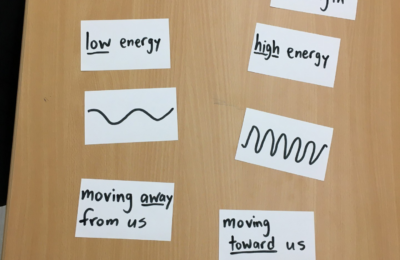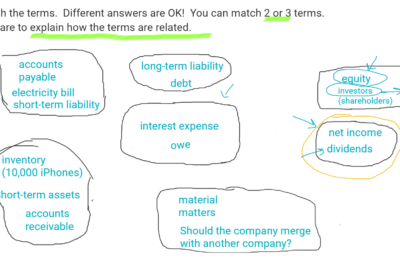How much time does it take to plan a lesson? Well, assuming the lesson plan is not just doing what the textbook tells you to do, I think the time it takes depends on whether you already have a good idea for a lesson. When a good idea comes to mind, lesson planning is just a matter of creating/gathering the materials you need and jotting down what exactly you’ll do in class.
But if you don’t already have an idea, and don’t want to settle for just following the textbook exactly, then you’ll need to use your right hemisphere a bit (creativity, imagination, intuition, etc.). At least for me, that means idea generation for lessons is a nonlinear process. I rarely plan really interesting, effective lessons in one sitting. Instead, it comes in bits and pieces at unforeseen times, including on my commute, during the middle of the night, and of course right before class.
Seeing the forest for the trees, and winging it with the trees
Sometimes I’ll spend a few hours just laying the framework for an activity I could repeat for a few weeks, without actually planning what I’m doing tomorrow. That means I usually “wing it” tomorrow, but the “winging it” goes rather well since I have the framework in place.

You could spend an hour of your time, say, gathering some good resources to use over the next few weeks, without actually making a specific plan for tomorrow. In contrast, you could make a detailed plan each night for “tomorrow’s lesson” again and again. The drawback here, in my opinion, is that you never really get to “zoom out” and invest time into planning a really good activity, something new.
3 scenarios for spending your time planning:
Your lesson planning time is a limited resource – I’ve found it can be “invested” in three ways. Must like investing in stocks, your lesson planning style is related to risk tolerance (i.e. you could spend hours brainstorming and hopefully come up with a great idea, or play it safe and spend much less time planning a textbook-based lesson). I guess it depends on what you’re comfortable with, your tolerance for “messiness” and open-endedness in a lesson plan, and how must time you’re willing to devote to brainstormingcreative you’re feeling.
- You could spend an hour or so planning tomorrow’s lesson in minute detail based on the “safety” of the textbook so you don’t risk doing anything on the fly (and save a little anxiety, in my experience)
- You could instead spend that hour exploring new materials, analyzing your students’ needs, and hopefully getting an idea for an exciting, effective new activity (but with only enough time remaining to create a loose sketch of your lesson rather than a minute-by-minute plan, thus “just winging it” to some extent?) Worst-case, you don’t come up with any good ideas at all, and feel so burnt out by all that wasted brainstorming that you wing it with the textbook!
- The last option: create a framework for a series of lessons. For example, make a “discussion preparation sheet” that students fill out for homework after they listen to lectures. It could contain an area for taking notes, recording new vocabulary, and preparing one’s own discussion questions to ask classmates. This might take up a good amount of time otherwise spent planning tomorrow’s lesson only, but it would shave some time off planning for multiple lessons going forward, since you now have a way to outsource the time spent preparing for class discussions, eliminate the need for explicit discussion questions, and diagnose which vocabulary is new for students.


